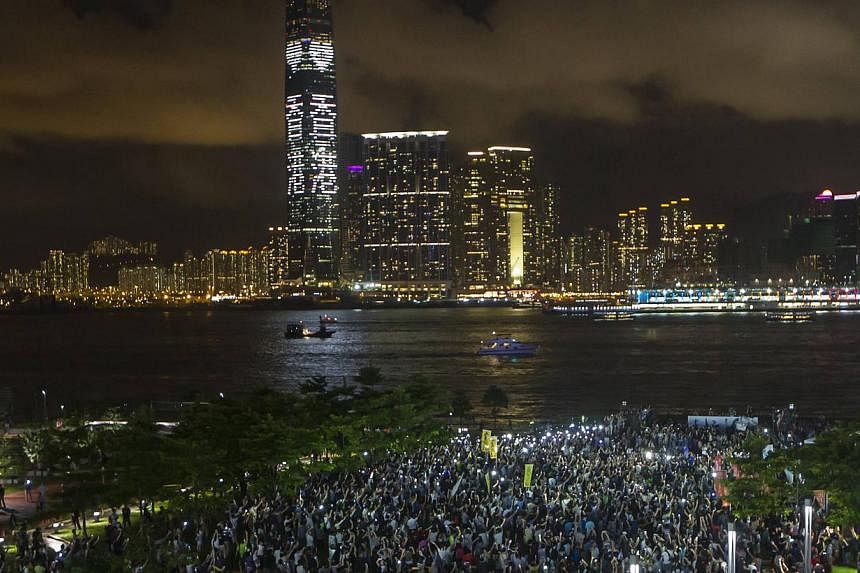HONG KONG (AFP) - Hong Kong pro-democracy activists admitted on Tuesday that they are powerless to overturn Beijing's refusal to grant them full voting rights, but the United States threw its weight behind the protesters, courting China's wrath.
Activist leaders had promised a new "era of civil disobedience" after Beijing crushed hopes for full democracy on Sunday, ruling that only pre-vetted candidates will be able to run for leadership of the semi-autonomous city in 2017.
But organisers from the pro-democracy group Occupy Central, who have vowed to take over the city streets, acceded defeat on Tuesday - even though they said the protest would still go ahead.
"We have to admit the fact that up to this point it is quite unrealistic to think that our action will change the decision made by Beijing," Occupy Central co-founder Chan Kin-Man said.
In a move set to enrage China's communist authorities, Washington, meanwhile, gave its backing to universal suffrage in the former British colony.
"The United States supports universal suffrage in Hong Kong in accordance with the Basic Law (Hong Kong's mini-constitution) and the aspirations of the Hong Kong people," State Department spokeswoman Jen Psaki told reporters. "We believe that an open society with the highest possible degree of autonomy and governed by rule of law is essential for Hong Kong's stability and prosperity."
The comments are likely to infuriate Beijing, which on Tuesday accused Britain of interfering in its domestic affairs over a British parliamentary inquiry into Hong Kong's political reforms.
"Hong Kong has returned to the motherland," China's foreign ministry spokesman Qin Gang said. "Issues concerning the political reform of Hong Kong falls totally within China's domestic affairs, which allows no interference from the outside."
But Chris Patten, Hong Kong's last British governor before the city was handed back to China in 1997, urged Britain to speak out. London has "moral responsibilities for what happens in Hong Kong", he wrote in the Financial Times newspaper.
Occupy Central is still planning to mobilise thousands of people to block major thoroughfares in the financial district of Central to protect the city's "core values" and "existing rights and liberties", Chan said. But he acknowledged that supporters who are more "pragmatic" may back down.
"Ten thousand protesters was our target set in the past. We are still confident that thousands of people will join and it will last at least for days," he said.
A later statement from Occupy appeared, however, to backtrack on comments that support might wane.
"It is not correct to say we have less support," it read. "Although some pragmatic supporters may leave, new supporters are joining us because they are angry about the Chinese government's decision."
Analysts said the movement may be changing tactics to dig in for a long-haul battle against Beijing.
"It is definitely a backing down but it is a strategic backing down," Surya Deva, a law professor at City University of Hong Kong, said.
"They know they can't really get the desired change by a short, intensive burst of civil disobedience. They're getting ready perhaps for a long-term campaign - and they need to build a base," he added.
Hong Kong police arrested 22 people during a series of protests targeting a senior visiting Chinese official, authorities said on Tuesday. In the kind of scenes that would be unthinkable on the mainland, Li Fei, a senior member of China's rubber-stamp parliament, has been dogged by angry demonstrations throughout his visit to Hong Kong.
On Monday, police used pepper spray on demonstrators at a convention centre where Li was giving a speech. Britain handed Hong Kong back to China in 1997 under an agreement which allows civil liberties not seen on the mainland, including free speech and the right to protest.
But discontent in the international financial hub is at its highest in years, with concerns growing that Beijing is waging ever-greater influence and that the city's freedoms are under threat.
The standing committee of China's National People's Congress, or parliament, said on Sunday that candidates for Hong Kong's leadership election in 2017 must be chosen by a pro-Beijing committee.
Candidates must win the backing of more than half of the committee members, with only two or three ultimately allowed to run for office. Democracy activists say this will effectively ensure that only pro-Beijing candidates can contest the vote. The proposal must win two-thirds support in Hong Kong's 70-seat legislature to pass.

